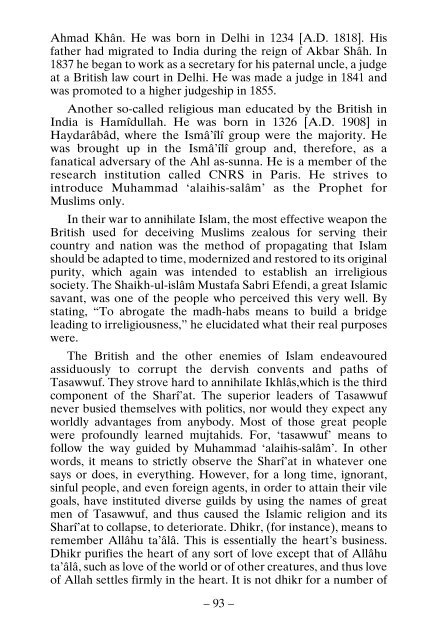Confessions Of A British Spy
Muhammad of Najd was the sort I had been looking for. For his scorn for the time’s scholars, his slighting even the (earliest) four Khalîfas, his having an independent view in understanding the Qur’ân and the Sunna were his most vulnerable points to hunt and obtain him. So different this conceited youngster was from that Ahmed Efendi who had taught me in Istanbul! That scholar, like his predecessors, was reminiscent of a mountain. No power would be able to move him. Whenever he mentioned the name of Abû Hanîfa, he would stand up, go and make an ablution. Whenever he meant to hold the book of Hadîth named he would, again, make an ablution. The Sunnîs trust this book very much. Muhammed of Najd, on the other hand, disdained Abû Hanîfa very much. He would say, “I know better than Abû Hanîfa did. In addition, according to him, half of the book of wrong.
Muhammad of Najd was the sort I had been looking for. For
his scorn for the time’s scholars, his slighting even the (earliest)
four Khalîfas, his having an independent view in understanding
the Qur’ân and the Sunna were his most vulnerable points to hunt
and obtain him. So different this conceited youngster was from
that Ahmed Efendi who had taught me in Istanbul! That scholar,
like his predecessors, was reminiscent of a mountain. No power
would be able to move him. Whenever he mentioned the name of
Abû Hanîfa, he would stand up, go and make an ablution.
Whenever he meant to hold the book of Hadîth named he would, again, make an ablution. The Sunnîs trust this book
very much.
Muhammed of Najd, on the other hand, disdained Abû Hanîfa
very much. He would say, “I know better than Abû Hanîfa did.
In addition, according to him, half of the book of wrong.
Create successful ePaper yourself
Turn your PDF publications into a flip-book with our unique Google optimized e-Paper software.
Ahmad Khân. He was born in Delhi in 1234 [A.D. 1818]. His<br />
father had migrated to India during the reign of Akbar Shâh. In<br />
1837 he began to work as a secretary for his paternal uncle, a judge<br />
at a <strong>British</strong> law court in Delhi. He was made a judge in 1841 and<br />
was promoted to a higher judgeship in 1855.<br />
Another so-called religious man educated by the <strong>British</strong> in<br />
India is Hamîdullah. He was born in 1326 [A.D. 1908] in<br />
Haydarâbâd, where the Ismâ’îlî group were the majority. He<br />
was brought up in the Ismâ’îlî group and, therefore, as a<br />
fanatical adversary of the Ahl as-sunna. He is a member of the<br />
research institution called CNRS in Paris. He strives to<br />
introduce Muhammad ‘alaihis-salâm’ as the Prophet for<br />
Muslims only.<br />
In their war to annihilate Islam, the most effective weapon the<br />
<strong>British</strong> used for deceiving Muslims zealous for serving their<br />
country and nation was the method of propagating that Islam<br />
should be adapted to time, modernized and restored to its original<br />
purity, which again was intended to establish an irreligious<br />
society. The Shaikh-ul-islâm Mustafa Sabri Efendi, a great Islamic<br />
savant, was one of the people who perceived this very well. By<br />
stating, “To abrogate the madh-habs means to build a bridge<br />
leading to irreligiousness,” he elucidated what their real purposes<br />
were.<br />
The <strong>British</strong> and the other enemies of Islam endeavoured<br />
assiduously to corrupt the dervish convents and paths of<br />
Tasawwuf. They strove hard to annihilate Ikhlâs,which is the third<br />
component of the Sharî’at. The superior leaders of Tasawwuf<br />
never busied themselves with politics, nor would they expect any<br />
worldly advantages from anybody. Most of those great people<br />
were profoundly learned mujtahids. For, ‘tasawwuf’ means to<br />
follow the way guided by Muhammad ‘alaihis-salâm’. In other<br />
words, it means to strictly observe the Sharî’at in whatever one<br />
says or does, in everything. However, for a long time, ignorant,<br />
sinful people, and even foreign agents, in order to attain their vile<br />
goals, have instituted diverse guilds by using the names of great<br />
men of Tasawwuf, and thus caused the Islamic religion and its<br />
Sharî’at to collapse, to deteriorate. Dhikr, (for instance), means to<br />
remember Allâhu ta’âlâ. This is essentially the heart’s business.<br />
Dhikr purifies the heart of any sort of love except that of Allâhu<br />
ta’âlâ, such as love of the world or of other creatures, and thus love<br />
of Allah settles firmly in the heart. It is not dhikr for a number of<br />
– 93 –


